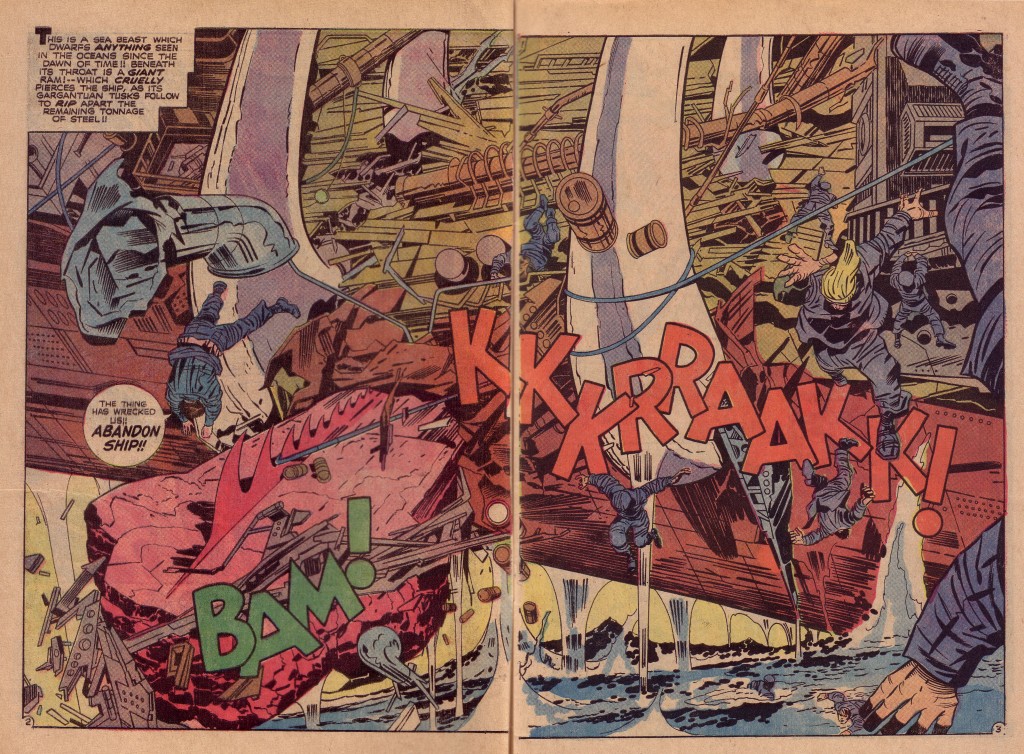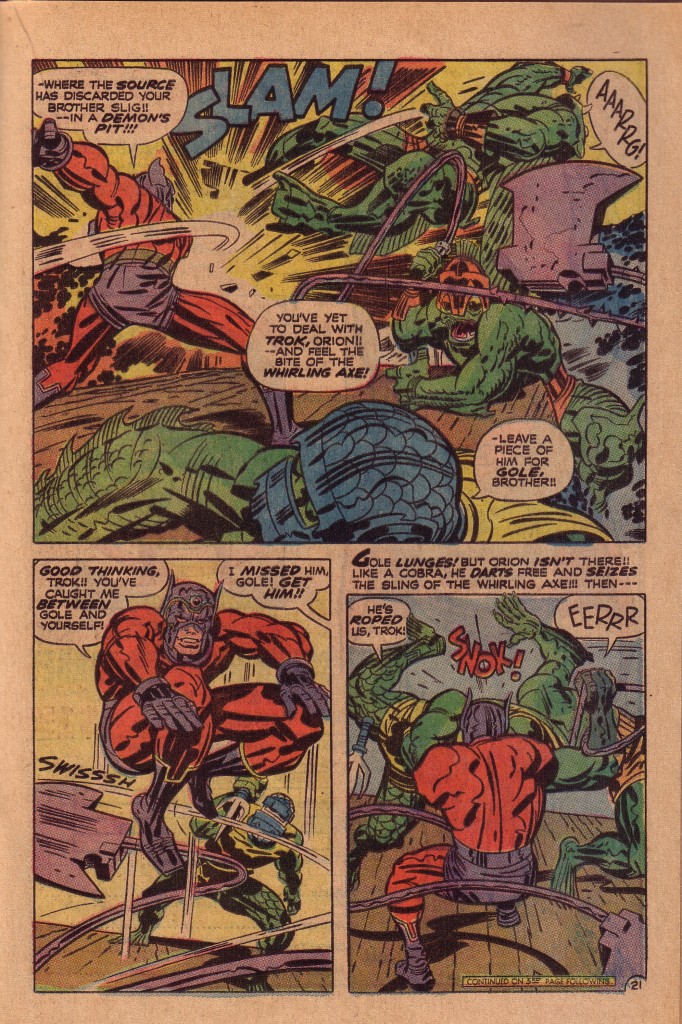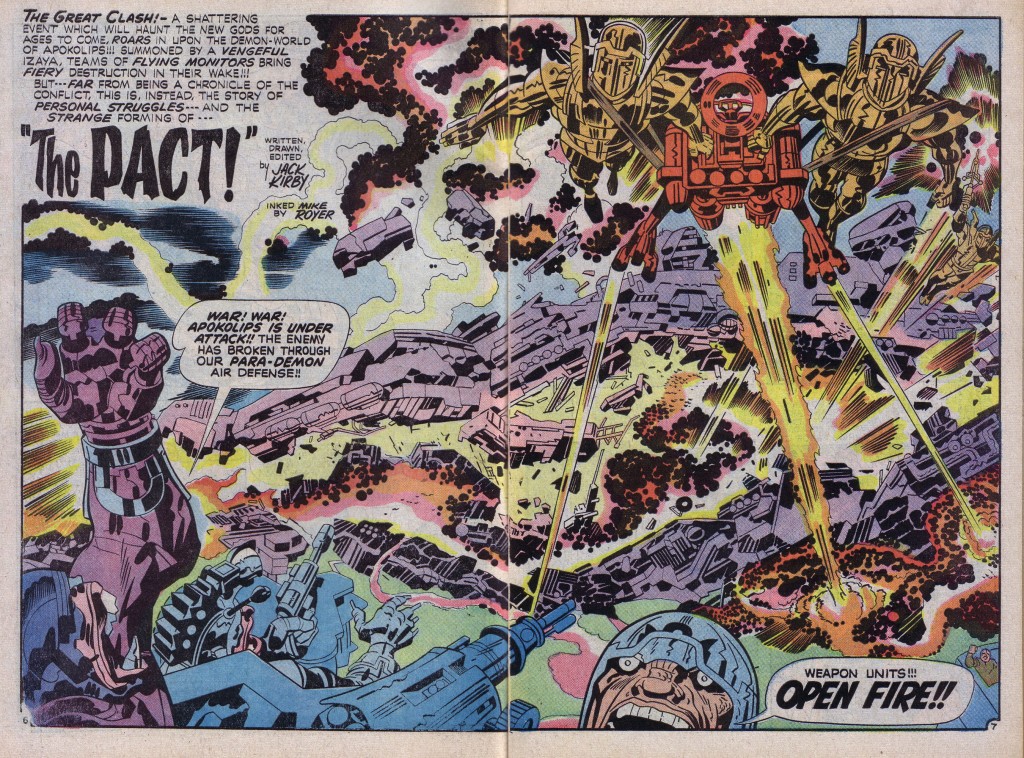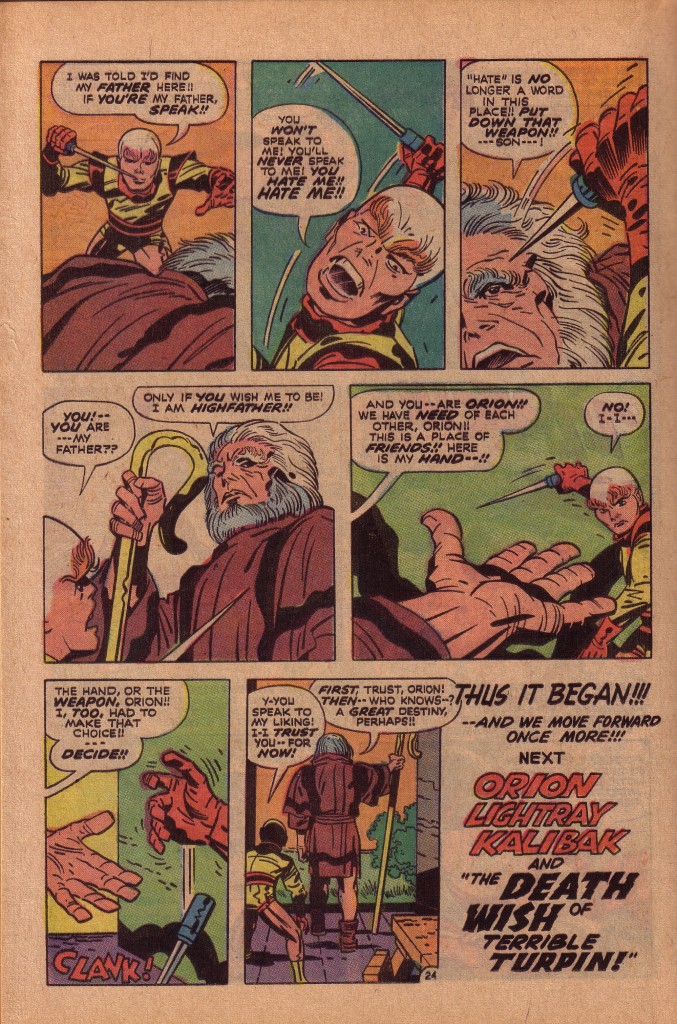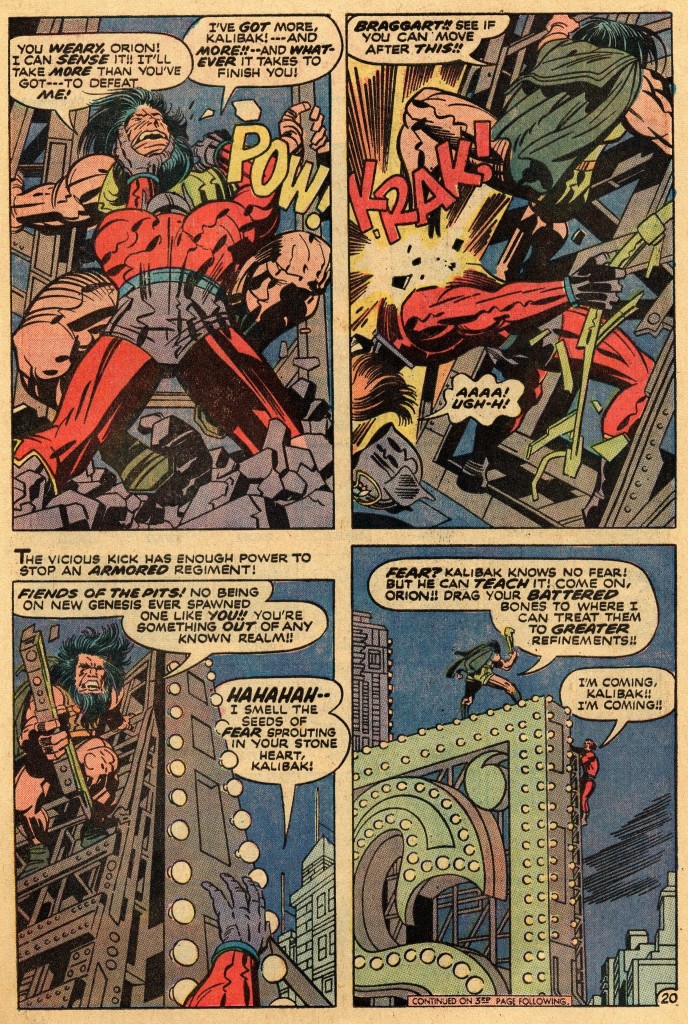Although opinions differ on the subject, many of Kirby’s fans believe that the King reached his artistic peak in 1972 with a sequence of three issues of The New Gods from #6 through #8. The Glory Boat in issue #6 begins with the spectacular demolition of a freighter by a demonic Whale like creature. The two -page spread showing the boats destruction is an amazing display of a fragment of time, as the Leviathan’s battering ram smashes through the hull, flinging scores of bodies into the sea. The eye, sweeping down the shape of the protruding tusk on the left immediately focuses on the ram and the figure suspended above it, and then travels rightward to the various figures in different positions within this incredible deep space composition. Even the lettered sound effects such as the bold diagonal Krack tie the composition together.
In this tableaux, we can imagine the entirety of this horrific incident, from impact to penetration to the ejection of human and other debris.
Like Melville’s Moby Dick, the sea beast here is a personification of destructive nature. It sets off a tale of division, loss and finally redemption within a nuclear family that represents the whole of humanity. The battle waged aboard the small wooden vessel is cataclysmic, bringing death to several of the antagonists.
The first panel here is a whirling maelstrom of violence, as Orion savagely smashes his Deep Six foes. Kirby uses the motion of the lanyard attached to the battle-ax to emphasize the violence of the melee. The distortion of musculature in the figures reaches an expressionistic zenith in this period of Kirby’s work.
As in the past, Kirby is dealing with larger, archetypal forces in this story as he leads up to his ultimate conception of the Source in the following issue, number seven’s The Pact.
The Pact is the story that brings the elements of the Fourth World together in one multi faceted arc. The cohesive breadth of this story has been a template for scores of imitators. The protagonist, Izaya is a warrior turned prophet of Biblical proportions who is first seen relaxing with his lady, Avia in a garden that seems to represent an Eden-like paradise. The murder of the lady at the hands of a villain precipitates a cataclysmic war that tears the universe of the New Gods asunder. This double page spread is a high point in Kirby-style Apocalyptic mayhem.
The bolts of energy that weave around the page tie the various elements together, leading the eye to the flying figures at above right and slicing down and back to the left. The canvas seethes with Kirby Krackle, a sure sign that the King is in High gear. This scene is very near to complete abstraction, and yet it is a vivid depiction of total devastation.
There is so much mayhem within this issue that we are nearly unprepared for its peaceful resolution, as young Orion, armed with a vicious weapon confronts his stepfather to be. Izaya, who is now Highfather, soothes the enraged boy and gets him to surrender his weapon as well as his distrust. The page is dominated by the symbolic use of hands, which Kirby has always employed to the greatest effect.
Orion enters the room poised to strike, but his hand is halted by Highfather’s own, in mid stroke. Highfather stands, and we see his hand holding his shepherd’s staff. Next we see his outstretched palm, which dominates the panel, extended toward Orion, who still shrinks back with uncertainty. Finally, we see the two hands together as Orion finally relinquishes his weapon. Again symbolically, Highfather can now turn his back on the boy, knowing that Orion is intrigued enough to follow him.
The blurb in the last panel informs us that we will move foreward once more, proceeding to the Death Wish of Terrible Turpin, and this is where the series reaches another climax of conflict between man and Demigod. The titular Turpin is a man of such overwhelming spirit that he can stand uncowed against Orion’s fierce half brother, Kalibak. Turpin’s remark, upon seeing the ferocious Kaliback atop a building is, “King Kong on a rooftop is no more dangerous than a nervous punk with a pistol. The idea is to give as good as you get.” Kirby is doing yet another riff on Kong, whom I have previously noted as a consistent source of inspiration for the artist.
Turpin, a stand in for Kirby is as relentless as is the King himself. Taking enough punishment to fell ten lesser men, Turpin just keeps on coming, astounding Kalibak with his tenacity.
Orion reaches Kaliback before he can kill Turpin, and the two antagonists carry their conflict to a huge sign high above the city’s rooftops.
This is an incredible four panel face off, with the panels mirroring the grid like structure of the girders that the two warriors straddle. The figures in the upper tier of panels are so full of kinetic energy that they threaten to burst out of their holding outlines. Kaliback’s vicious kick to Orion’s chest is an explosive release of the seething pent up force in the first panel.
As small as they are, the last two frames give us a wonderful illusion of the deep space of a cityscape. It is the scale of the buildings in comparison to the sign and the figures that creates this wonderful illusion of depth. This is something that Kirby does so well. He is capable of creating the total sense of an environment by using small details to suggest the mood and surroundings that he places his characters within.
In the nick of time, Lightray snatches Orion from the rooftop, as a tremendous bolt of energy fells Kalibak. We have the feeling here that all the opponents have suffered terribly and no one appears to have won. Even Orion has been forced to reveal the face of the darkness inside of him.
Kirby again shows us the perspective of someone who has faced war at close range and understands its often ugly and senseless nature. What we know for certain is that there is more here in the conflicts of the Forth World than the bluster of battle.


